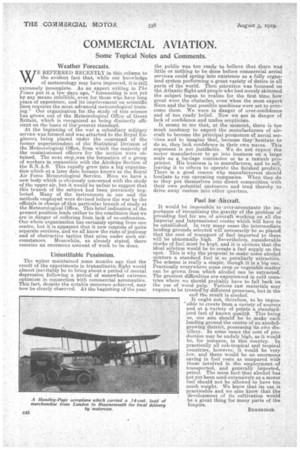COMMERCIAL AVIATION.
Page 20

If you've noticed an error in this article please click here to report it so we can fix it.
Some Topical Notes and Comments.
Weather Forecasts.
WE REFERRED RECENTLY in this column to the evident fact that, while our knowledge of meteorology may have improved, it is till extremely incomplete. As an expert writing in The Times put it a few days ago, "forecasting is not yet by any means infallible, even for those who have long years of experience, and its immeovement on scientific lines requires the most advanced meteorological training." Our organization for the study of this science has grown out of the Meteorological Office of Great Britain, which is recognized as being distinctly eflis dent on the basis of the'present standard.
At the beginning of the war a subsidiary military service was formed and was attached to the Royal Engineers being placed under the command of the former superintendent of the Statistical Division of the Meteorological Office, from which the majority of the conimissioned officers for the. Section were obtained. The next stewas the formation of a group of workers in connection with the Airships Section of the R.N.A.S. This rapidly grew into a big organization which at a later date became known as the Royal Air Force Meteorological Service. Here we have a new body which is obviously concerned with the study of the upper air, but it would be unfair to suggest that this branch of the subject had been previously neglected. Many of the instruments in use and the methods employed were devised before the war by the officials in charge ofethis particular branch of study at the Meteorological Office. This brief indication of the present position leads rather to the conclusion that we are in danger of suffering from lack of co-ordination. Our whole organization has certain4y sprung from one centre, but it is aPpaisent that it now consists of quite separate sections, and we all know the risks of jealousy and of obstructive tactics that arise under such circumstances. Meanwhile, as already Stated, there remains an enormous amount of work to be done.
Unjustifiable Pessimism.
The writer maintained some months ago that the result of the experiments in transatlantic flight would almost inevitably be to bring about a period of mental depression following a period of somewhat extreme. optimism in connection with commercial aeronautics. This fact, despite the notable successes achieved, may now be clearly observed. At the beginning of the year
the public was too ready to believe that there was little or nothing to be done before commercial aerial services could spring into existence as a fully organized system performing a great variety of duties in all parts of the world. Then attention was focussed on 'the Atlantic flight and people who had merely skimmed the subject beganto -realize for the first time how great were the obstacles, even when the most expert fliers and the best possible machines were set to overcome them. We were in danger of over-confidence and of too ready belief. Now we are in danger of lack of confidence and undue scepticism.
It seems to me that, at the moment, there is too much tendency to expec. t the manufacturers of aircraft to become the principal promoters cif aerial services and to imagine that,. because they ' hesita.te to do so, they lack confidence in their own wares. This
i
argument s not justifiable. We do not expect the motor manufacturer to go into business on a large scale as a haulage contractor or -as a taxicab proprietor. His business is to manufacture, and to sell, leaving it to others to operate the finished product. There is a good reason why ina.nufacturers should hesitate to run operating companies. When they do so they put themselves into direct -competition with their own potential customers and tend thereby to drive away custom into other quarters.
Fuel for Aircraft.
It would be impossible to overeaCeentuate the importance of recognizing the gravity of the problem of prouiding fuel for use of aircraft working on all the Imperial and International routes which will have to be established. In very many cases the intermediate landing grounds selected will necessarily be se placed that the cost of transport of fuel imported to them will be abnormally high. Nevertheless, considerable stocks of. fuel must be kept, and it is obvious that the • ideal sOlution would be to create a fuel supply on the spot. This is why the proposal to make some alcohol mixture a standard fuel is so peculiarly attractiie. The scheme is really a simple, though it is a big one. Practically everywhere some crop or vegetable matter can be grown from which alcohol can be extracted. The greatest difficulties are experiencedin cold countries where, we should probably have to fall back on the use of wood pulp. -Various raw materials may require to be treated-by different processes, but-in the end the result is alcohol.
It ought not, therefore, to be impossible to create from a variety of sources and, at a .variety of points a standardized fuel of known quail* This -being so, our aim should be to make each . landing ground the centre of an alcoholgrowing district, possessing its own distillery. In some cases the cost of production may be unduly high, as it would be, for instance,, in this country. In practically all .4-tropical and tropical -countries, however, it would be very low, and there would be an enormous saving in fuel costs as compared with those, involved in the employment, of transported, and generally imported, petrol. The mere fact that alcohol has not yet been used extensively as a motor fuel should not be allowed -to have too much weight. We know that its use is practicable and we also know that the development of its cultivation would be a great thing for many parts of the Empire.






















